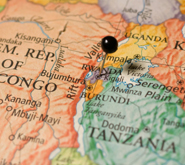The project will address the aspect of language-related underperformance in school which has been compounded by the recent switch from French to English as the language of wider communication taught in Rwandan primary schools that has left many teachers, let alone pupils, struggling to keep up.
Led by academics from the University’s Graduate School of Education, the team will work with education providers and textbook publishers to create more accessible textbooks that can be understood by pupils with low-level English language proficiency and help teacher trainers to develop language-supportive teaching techniques to go alongside the textbooks.
Previous studies of classroom reading in Rwanda suggest that the reading of subject textbooks is a rare occurrence — before the change of medium one study claimed that only 0.77 per cent of students in their final year of primary school could read adequately for their studies in English. This leads to poor subject comprehension and a reduced ability to demonstrate subject knowledge in written English, which then becomes a major cause of failure in examinations.
Professor Leon Tikly, Project Director, said: “Education that is accessible is key to helping improve the lives’ of disadvantaged communities in rural Africa, however for many people the reality is that they are not able to reach their full potential due to the limited language accessibility of learning materials.
“The sudden switch to English has impaired learning achievement by denying pupils the accessibility to education, meaning both pupils and teachers in Rwanda are experiencing low levels of language fluency. Therefore there is an urgent need for textbooks which learners can read and teachers can convey effectively.
“We hope that this new project will improve the learning ability of pupils as well as improved practice by participating teachers.”
The research team will also be making recommendations for textbook and inspection frameworks to ensure more language appropriate textbooks are provided for schools.
The team will be working with the Kigali Institute of Education, the British Council (Rwanda) and the Rwanda Publishers and Booksellers Association. The 28-month study, a sister project to the three year ‘Language Supportive Teaching and Textbooks in Tanzania (LaSTT)’ project led by Dr Angeline M. Barrett also in the University’s Graduate School of Education, will encompass the Ngororero district (Western province), Nyagatare district (Eastern province), Kamonyi district (Southern province) and Burera district (Northern province) of Rwanda in Africa. The project is supported by a new Innovation for Education Fund set up by the Rwandan government with funding from the UK Department for International Development.
